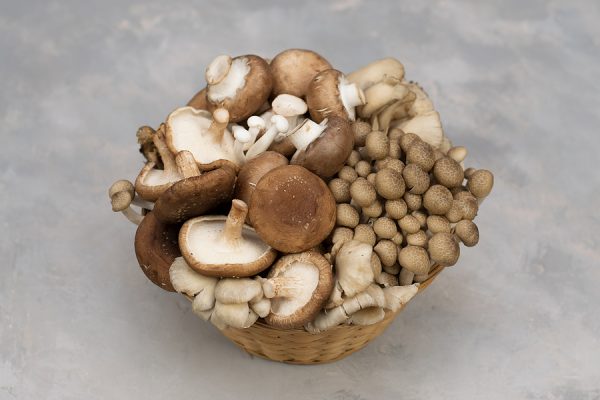Mushrooms are a staple in my kitchen. I toss them in my omelets and frittatas, put them in soups, stews and stir fries, add them to salads and veggie wraps, and use them as a topping on meats and fish.
As it turns out, I’m the “odd man out.”
The average American only eats about four pounds of mushrooms – per person – in a given year. But me? I probably eat somewhere between a half pound and a full pound each week or so.
Lucky me, because mushrooms are, by far, the most abundant source of ergothioneine (ergo) in our food supply.
Ergo is a powerhouse when it comes to protecting your DNA and powering up your mitochondria for life-long health and energy. It’s a powerful free radical scavenger, anti-inflammatory and protects against radiation. It also acts as a chelation agent against heavy metals such as mercury and cadmium.
It is this compound that may be responsible for some of the wonderful health benefits of mushrooms.
Here’s what a Few Ounces of Mushrooms Each Week can do for You
Edible mushrooms have been used medicinally for thousands of years. And for good reason!
Just take a look at some of the incredible things a few ounces of mushrooms each week can do for you.
- Just two ¾ cup servings (about 5.2 ounces) of cooked mushrooms twice each week could potentially reduce your odds of mild cognitive impairment by 50%.
- Older individuals who enjoy three or more servings of mushrooms a week lower their chances of dementia by about 19%.
- Eating just one or more fresh button mushroom every day can decrease breast cancer risk in pre-and postmenopausal women as much as two thirds. (Note: One button mushroom weighs about 10 grams; less than a third of an ounce.)
- In men, consumption of mushrooms three or more times per week is associated with a 17% lower risk of prostate cancer.
- Substituting eight ounces of meat with eight ounces of fresh mushrooms three times each week can result in weight loss, lower body mass index, reduce waist circumference and lower total body fat. It can also help improve blood pressure, lipid profile and inflammatory markers.
- White button mushrooms act as a prebiotic, which helps support a healthy gut microbe. This, in turn, could assist in better glucose control.
These are a lot of great reasons to add more mushrooms to your diet.
How to Get More Mushrooms in Your Diet
There are a lot of ways to eat mushrooms.
Taking a nod to Forrest Gump, I would say that you can eat them raw or cook them up. You can stuff them, bake them, broil them, grill them or steam them. You can add them to salads, sauces and sandwiches. At an evening meal, they could be the soup, the appetizer, the main dish, the garnish, the side dish, or all five.
It just depends on how much you like mushrooms.
For the highest ergothioneine content go for the exotics. Shiitake, oyster and maitake are the most potent. They can contain up to 13 mg of ergo in a three-ounce serving.
But that doesn’t mean you can’t get a decent dose of ergo in more commonly consumed mushrooms. Portabellas and criminis also have a great ergothioneine profile, followed closely by white buttons.
If you’re anti-fungi – as some people are – you can always look for an ergothioneine supplement.
And by the way… don’t forget to buy organic!
SOURCES:
Zhang Y, et al. Edible Mushroom Cultivation for Food Security and Rural Development in China: Bio-Innovation, Technological Dissemination and Marketing. Sustainability. 2014, 6(5), 2961-2973.
Royse DJ, et al. Current overview of mushroom production in the world. In: Zied DC, Pardo-Giménez A, editors. Edible and medicinal mushrooms: technology and applications. Hoboken: John Wiley & Sons Ltd; 2017.
Feng L, et al. The Association between Mushroom Consumption and Mild Cognitive Impairment: A Community-Based Cross-Sectional Study in Singapore. J Alzheimers Dis. 2019;68(1):197-203.
Zhang S, et al. Mushroom Consumption and Incident Dementia in Elderly Japanese: The Ohsaki Cohort 2006 Study. J Am Geriatr Soc. 2017 Jul;65(7):1462-1469.
Zhang M, et al. Dietary intakes of mushrooms and green tea combine to reduce the risk of breast cancer in Chinese women. Int J Cancer. 2009 Mar 15;124(6):1404-8.
Zhang S, et al. Mushroom consumption and incident risk of prostate cancer in Japan: A pooled analysis of the Miyagi Cohort Study and the Ohsaki Cohort Study. Int J Cancer. 2019 Sep 4.
Poddar KH, et al. Positive effect of mushrooms substituted for meat on body weight, body composition, and health parameters. A 1-year randomized clinical trial. Appetite. 2013 Dec;71:379-87.
Feeney MJ, et al. Mushrooms and Health Summit proceedings. J Nutr. 2014 Jul;144(7):1128S-36S.
Tian Y, et al. Prebiotic effects of white button mushroom ( Agaricus bisporus ) feeding on succinate and intestinal gluconeogenesis in C57BL/6 mice. Journal of Functional Foods. 2018; 45: 223.






